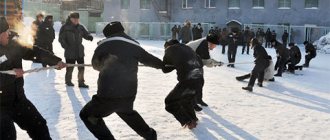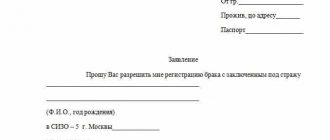Correctional labor as a type of criminal punishment has been practiced by the court for more than 20 years.
On the scale of severity, this type is considered the third of all mild punishments (the most lenient is a fine).
The purpose of correctional labor is to punish a person convicted of a crime by engaging him in paid work. Below is all about this type of punishment.
The State Duma will reduce the sentences of convicts
The term will not change if the sentence is served in a disciplinary military unit, in a prison or a maximum security colony. In case of restriction of freedom, one day will be counted as two. For correctional labor and restrictions on military service - one day in three. In the case of compulsory work - at the rate of one day of detention - for eight hours of compulsory work. When serving a sentence in a general regime correctional colony or educational colony - one and a half days. When serving a sentence in a penal colony - two days. The period of detention in a pre-trial detention center is also taken into account. For example, the convict was in custody for 2 years, and he was sentenced to 3 years in a general regime colony. The coefficient “1 year for 1.5 years” gives the convicted person the opportunity to be released immediately after the court’s decision.
According to legislators, the amendments should serve to further humanize the penal system and are aimed at implementing the principle of justice in relation to convicts. “The Supreme Court supported us; this will apply to those who are serving a sentence now or will serve a sentence in the future,” Krasheninnikov explained to URA.Ru.
ITR - corrective labor
I work in the criminal-executive inspection, and therefore I would like to somewhat dispel the myth about release from places of detention for correctional labor. Indeed, this rarely happens, because: 1) replacement of punishment is possible only in agreement with the head of the correctional institute, and they, as a rule, do not agree, because it is not easy to find a job for a convicted person in the face of unemployment, and besides, the convicted person still needs to be monitored ; 2) work for the convicted person is provided only from the list of enterprises approved by the Head of the city. As a rule, this is a job that is not in demand among the population (landscapers, janitors, etc.). In addition, the convicted person does not have the right to refuse the offered work. The salary is low, -20% in state income. Sick leave, time off, and vacations are not counted toward the term of serving the sentence. The working day is 8 hours. You must appear at the inspection at the appointed time less than once a month. You cannot commit administrative offenses. In our city, for example, convicts are prohibited from providing work through the Employment Center. This is explained by the high level of unemployment among free people. Many convicts, having learned about the conditions of serving their sentences, refuse to be replaced with correctional labor.
In principle, the law does not say where a person must work. In theory, if he cannot find a job himself, then the inspectorate should provide it to him. However, very often, when a person appears for registration, he discovers that he is forced to find employment only in those organizations that the inspectorate indicates to him. As a rule, this is work related to landscaping (mowing grass, removing snow, working as a janitor or loader), sometimes more qualified if there are vacancies for it in the labor organization. In rural areas, this is the work of harvesting crops, a cattleman, the same territory cleaner, etc.
We recommend reading: Calculator for Calculating Pension for Rent
Where does correctional work take place?
If the convicted person was already employed before the court decision, he is allowed to continue working there. If there is no permanent job, then the court determines the place where he will work.
For the unemployed, municipal organizations are usually selected where low-paid work is in demand (janitor, landscaper, loader, cleaner).
The list of such organizations is approved annually by the municipality and the head of the criminal-executive inspection.
Sometimes the number of employers includes individual entrepreneurs and commercial organizations where simple labor is needed.
Exemption under ITR
35.1. Zilya, good afternoon! Very confusing and unclear. It is impossible to do without familiarizing yourself with the verdicts and all subsequent decisions. But in general, if there is only a technical error, then there are two options: either write a petition for clarification of the verdict or write a statement to amend the verdict.
25.2. Hello! - Is this some kind of new thing in legislation? There is an article 80. Replacement of the unserved part of the punishment with a milder type of punishment 1. A person serving detention in a disciplinary military unit, forced labor or imprisonment, who has compensated for the damage (in whole or in part) caused by the crime, the court, taking into account his behavior during the period of serving the sentence, may replace the remaining unserved part of the sentence with a more lenient punishment. In this case, the person may be fully or partially released from serving an additional type of punishment. Good luck!
Responsibility for improper serving of correctional labor
The criminal executive legislation prescribes measures for violators of the order of serving all types of sentences, the execution of which is controlled or ensured by divisions of the penitentiary service, including correctional labor. They differ in the degree of danger and are divided into simple violations and malicious evasion of service.
Violation of the order and conditions of serving
The Penal Code defines violations of the procedure and conditions for serving correctional labor as:
- failure to appear for work within five days from the date of receipt of the order from the Penal Inspectorate, unless there are good reasons for this;
- failure to appear without sufficient reasons at the police station;
- absenteeism (according to the Labor Code of the Russian Federation - absence from the workplace during a working day (shift), as well as for 4 hours in a row, without good reason);
- appearing at work (at the workplace, the territory of the employing organization or the facility where the employee must work) in a state of intoxication resulting from the use of alcohol, drugs or other toxic substances.
For such facts, the Penal Inspectorate has the right to apply the following measures to the employee:
- in writing, no later than three working days from the date of the violation, against signature, warn the convicted person about the possibility of replacing correctional labor with a more severe punishment;
- oblige him to visit the inspection every month (up to 2 times) for the purpose of registration, for which a decision is made.
Malicious evasion of serving
Malicious evasion is determined by the criminal-executive inspection:
- In the event of a repeated violation, after a written warning, of absolutely any of the above.
- If the convict has fled from his place of residence and his whereabouts are unknown. He is put on the wanted list, he can be detained for two days, this period can be extended by the court to 30 days.
Consequences of violations
The most negative consequence of improperly serving correctional labor is its replacement with a more severe punishment - forced labor or imprisonment.
Such a decision is authorized to be made exclusively by the court based on the results of consideration of the relevant justified request of the criminal investigation department, supported by information from the personal file of the violator, characterizing him and confirming the fact of evasion.
The petition is prepared and submitted to the court:
- within 3 days from a repeated violation (weekends and holidays are not taken into account);
- in relation to an absconding person - after the initial search activities.
Replacement occurs at the rate of 1 day of new punishment for every 3 days of unserved correctional labor.
Changes to Article 80 of the Criminal Code of the Russian Federation in 2022 - latest news
Part 2 states: “When a court imposes a sentence of imprisonment for a term of more than 5 years, forced labor is not applied.” Part 4 specifies that they are appointed for a period of 2 months to 5 years. However, the bill amending Art. 53.1 and art. 80 of the Criminal Code of the Russian Federation proposes to adjust the existing procedure. Thus, even those prisoners whose sentence exceeded the period of 5 years established by the current norm will have the opportunity to return to society.
Currently there are 12 ICs and 17 PSs. Although they are only 20% full, their total capacity limit is 2,351 people. There are much more convicts who will be able to end up in them with the adoption of the law. There are plans according to which, from the beginning of 2022, 3 additional information centers and 32 information centers will open; there are figures that the total number of centers will reach 64. Then the occupancy limit in general will be 5,678 people. Whether this will be enough is unknown.
Peculiarities of appointment when convicted of several crimes
Cases of conviction for multiple crimes are not uncommon. For them, the law establishes rules for assigning punishments, including correctional labor.
Set of crimes
The convicted person is charged with several criminal acts and one criminal case is considered based on these facts, that is, one sentence is passed. In this case, the court determines only the terms of correctional labor, and the final punishment is imposed by adding them in full or in part, after which the percentage of deduction from earnings is determined.
For example, two crimes were committed, for one six months of correctional labor were imposed, for the second - 8 months, and finally, by partially adding them up, the punishment was determined to be 9 months with the deduction of 10% of earnings in favor of the state.
Aggregate sentences
This is a situation where a person has already been convicted of another crime and commits a new one, for which a new sentence is imposed. Here, the partially or completely unserved part of the correctional labor under the old one is added to the punishment under the new court decision in the case, and the percentage of deduction from earnings remains the same, assigned under the first verdict.
In situations where different types of punishments are applied when determining their final type and duration based on the totality of crimes and sentences, the rules of Art. Art. 69 and 70 of the Criminal Code of the Russian Federation.
From strict regime to engineering where to work
If the court decides positively on the transition to engineering and technical training, HOW CAN HE TRANSFER TO HIS OWN CITY AT THE PLACE OF REGISTRATION TO WORK INTO technical technical training, if at the time of his arrest he did not have a permanent place of work, but worked (repairing office equipment) under an agreement or privately.
You can apply for parole if you have served these unrelated things. Parole can be applied only after the convicted person has actually served: a) at least one third of the sentence imposed for a crime of minor or moderate gravity; (as amended by Federal Law No. 25-FZ dated 03/09/2021) (see.
Procedure and conditions of execution
Having received the verdict, the Penitentiary Directorate, no later than 30 days later, sends the convicted person to serve his sentence. A personal file is opened against him, where all documents related to the convict’s serving of correctional labor are collected.
Calculation of the term of correctional labor
The start of serving correctional labor varies depending on whether the convicted person has a permanent place of work:
- if so, the beginning of the period is the day the employer receives the relevant documents from the UII;
- if not, the day he went to work.
The term is calculated in months and years in which the convicted person worked and deductions were made from earnings. Moreover, in each month he must work exactly as many working days as there are in that month.
If the number of these days does not coincide, the punishment is served until they are fully served. Periods when the convicted person did not work are not included in the period of correctional labor served.
On the day the sentence ends, the Penitentiary Directorate sends a notice to the organization where the convicted person works to stop deductions from earnings. If the execution of the punishment is canceled for other reasons (exemption from punishment, replacement with a more severe one) - on the next working day after receipt of the documents on which it was canceled (court decision).
Features of labor relations
Employees sentenced to correctional labor are subject to all requirements of labor legislation with exceptions established by the Criminal Code and Penal Code of the Russian Federation.
Thus, a convicted person does not have the right to refuse a job offered to him and must:
- not violate the conditions and procedure for serving the sentence;
- treat your work responsibilities conscientiously;
- attend the Institute on call;
- notify the management office 10 days in advance of a change of job or place of residence.
While serving correctional labor, voluntary dismissal without the written consent of the Penitentiary Inspectorate is prohibited. The dismissal refusal by the Penal Inspectorate can be appealed.
Temporary disability benefits are calculated based on earnings without deducting from it amounts withheld by a court verdict.
Leave for those serving correctional labor
The annual paid leave of a person sentenced to correctional labor is 18 days; it is not equal to the standard duration of such leave under labor law (28 days). It can be used not at any time in accordance with the sequence established by the employer, but at a time agreed with the UII.
In this case, the convicted person is not deprived of the right to vacation days unused during correctional labor (that’s 10 days a year) and can claim them upon completion of serving his sentence.
Other leaves according to the law (additional, for example, for employees with an irregular schedule, for hazardous working conditions, etc.) can be used on a general basis.
Employer Responsibilities
The employer of a person sentenced to correctional labor is obliged to:
- Make deductions from his earnings correctly and on time.
- Control his behavior.
- Help the UII in educational work.
- Comply with the conditions of serving the sentence.
- Report to UII:
- on the encouragement of a convicted employee, penalties imposed on him, evasion from serving a sentence;
- about the upcoming transfer or dismissal of the convicted person.
Engineering and technical equipment for convicts
The replacement of the unserved part of the sentence with a more lenient punishment is provided for in Art. 80 CC. According to the current Criminal Code, this replacement is possible while a person is serving three sentences: restriction of freedom, detention in a disciplinary military unit or imprisonment.
1. For a person serving detention in a disciplinary military unit, forced labor or imprisonment, who has compensated for the damage (in whole or in part) caused by the crime, the court, taking into account his behavior during the entire period of serving the sentence, may replace the remaining unserved part of the sentence with a more lenient punishment. . In this case, the person may be fully or partially released from serving an additional type of punishment.
Possible places of work for convicts
As mentioned above, employed convicts serve correctional labor at the place of their employment. That is, serving for them is reduced to the performance of their daily work duties with exceptions established by law, which will be discussed below (deduction of part of the salary, reduced duration of annual leave, inability to resign without the permission of the Penitentiary Inspectorate, and so on). In this case, employment must be exclusively official.
- If a convicted person works, but his employment is not registered in accordance with the requirements of labor legislation, he is considered unemployed.
- If the person held accountable was employed during the trial before the verdict was passed, he should provide a certificate from the employer about official employment at the court hearing and request that it be included in the case materials. In this case, the place of serving the sentence is determined by the place of work. If this information is not available, even if you have official work, the court will not be able to do this.
Assigning places of correctional work to the unemployed
Non-working persons sentenced to correctional labor are sent by the Criminal Executive Inspectorate to work in any organizations determined by the local government body (LSG), the list of which is agreed upon between them.
If a convicted person gets a job before registering with an organization that is not approved by the local self-government body, the penal inspection approves it as the place where the sentence will be served.
When choosing a place of work, the following are taken into account:
- crime committed;
- health status;
- profession, skills;
- place of residence.
For persons under 18 years of age, individual personality traits (age, psychological) and other conditions are additionally taken into account.
Convicted unemployed citizens are issued an order by the penal inspection to report to their employing organization to serve their sentence. This organization may refuse an employee, but only because of the inadequacy of his professional qualities. Otherwise, the refusal is illegal and the UII will appeal it to the prosecutor's office.
Expert opinion Anna Prokhorova Lieutenant Colonel of Justice. Higher legal education with specialization in criminal procedure. Most often, places for convicts to work are determined in municipal organizations - housing and communal services, improvement, maintenance and operation of transport, etc. These organizations often have a shortage of workers in low-paid positions that do not require qualifications - janitor, laborer, cleaner, etc.
Amendments to serious articles in 2022
Criminal Code of the Russian Federation. 5. Exempt from punishment women with minor children, pregnant women, women over 55 years of age and men over 60 years of age, men with children under 3 years of age, persons with I, II or III disability groups, probationers and paroled from the remaining unserved part of the sentence before the entry into force of this Resolution, as well as persons who committed crimes under the age of 18, pregnant women, women over 55 years of age and men over 60 years of age, men with children under the age of 3 -x years, persons with I, II or III disability group, sentenced to penalties not related to imprisonment; 6.
Changes to the criminal code in 2022. The State Duma plans significant changes to the criminal code in 2022. The purpose of introducing such amendments is to eliminate shortcomings in the current legislation and eliminate conflicts. What they are, when new measures are planned to be introduced, and under what conditions they will be applied, can be found out from the material presented.
Amendments to parole in 2021
Statistics confirm that Russia occupies one of the leading places in the world in terms of the ratio of normal population to criminals, so the government should take all possible measures to adapt convicts to social life in freedom in order to adopt such amendments. It is believed that the mass release of prisoners will lead to a significant reduction in state budget expenses for their maintenance.
It is imperative that measures for early release be taken in relation to citizens who bear criminal penalties in connection with the commission of a criminal offense. For those sentenced to perform public works, it is possible to apply an amnesty as a matter of priority.
Bill on forced labor
a) part two, after the words “for a period of more than five years,” shall be supplemented with the words “except for cases of replacement of punishment in the form of imprisonment with forced labor in accordance with Article 80 of this Code,”;
Introduce into the Criminal Code of the Russian Federation (Collected Legislation of the Russian Federation, 1996, No. 25, Art. 2954; 2022, No. 11, Art. 1002; 2022, No. 50, Art. 4848; 2022, No. 31, Art. 3921; No. 45 , Art. 5263; No. 52, Art. 6453; 2022, No. 50, Art. 7362; 2022, No. 10, Art. 1162; 2022, No. 52, Art. 6997; 2022, No. 19, Art. 2309; 2022, No. 18, Article 2566) the following changes:
We recommend reading: St. Petersburg State University Grants
What is correctional labor according to the Criminal Code of the Russian Federation?
Correctional labor is a type of criminal punishment that is applied to criminals solely by court decision.
If the judge finds the crime proven, he will force the defendant to work for the benefit of society for a certain period of time in the form of an instructive punishment.
The concept and rules for assigning correctional labor are discussed in the general part of the Criminal Code of the Russian Federation.
In accordance with Art. 50 of the Criminal Code of the Russian Federation, correctional work involves the work of convicts in a place established by the state inspection, which subsequently monitors the execution of the sentence.
The essence of correctional labor is to attract a person to work with the retention of part of the earnings in favor of the state.
An employed convict will continue to work in the standard mode, unless the court has ordered otherwise, while the state will collect a certain portion of his salary every month in the amount of 5 to 25% of the salary. The deduction will be made from all other payments received by the convicted person.
If the salary is paid not in financial form, but in kind, then a calculation will be made of what part to withhold from it. This does not exclude taxes and other deductions that are subject to taxation by law.
My own lawyer
if this person is ready to tell everything, let him write a confession, then the prosecutor’s office will be obliged to conduct an inspection and if the results of the inspection are positive, then the prosecutor will go to court with demands to cancel the verdict due to newly discovered circumstances
4. When considering a petition from a convicted person or a submission from the administration of an institution or body executing a sentence to replace the unserved part of his sentence with a milder form of punishment, the court takes into account the behavior of the convicted person, his attitude to study and work during the entire period of serving the sentence, the attitude of the convicted person to the committed act and that the convicted person partially or fully compensated for the damage caused or otherwise made amends for the harm caused as a result of the crime. In relation to a convicted person suffering from a disorder of sexual preference (pedophilia), which does not exclude sanity, and who, at the age of over eighteen years, has committed a crime against the sexual integrity of a minor under fourteen years of age, the court also takes into account the application of compulsory medical measures to the convicted person, his attitude towards treatment and results of forensic psychiatric examination.
How does PTR differ from ITR?
Forced labor (hereinafter PTR) and correctional labor (hereinafter ITR) are two different types of criminal punishment, which have one thing in common - the forced involvement of a convicted person in labor with a deduction of a certain part from his earnings, to the state income.
Both of these types of punishment, in cases specified by law, can be used to impose a punishment not related to imprisonment, that is, instead of imprisonment.
The main differences between PTR and ITR, assigned to persons previously sentenced to real terms of imprisonment, as a replacement for the unserved part of the sentence .
In accordance with Part 3 of Art. 175 of the Penal Code of the Russian Federation for a convicted person, the unserved part of the sentence can be replaced with a more lenient type of punishment. A lawyer (legal representative) has the right to petition the court to replace the unserved part of the sentence with a more lenient punishment. PTR is one of the alternatives to imprisonment. Thanks to the adopted amendments to Article 80 of the Criminal Code of the Russian Federation, its prospects have become closer for all prisoners. Today, in order to petition the court to replace the unserved part of the sentence with forced labor, the convicted person must serve: ¼ of the term - for crimes of minor and medium gravity; 1/3 of the term - for serious crimes; ½ - term - for especially serious crimes.
If the court makes a positive decision to replace the unserved part of the sentence with forced labor, the convicted person is transferred to a specialized correctional center (hereinafter referred to as the IC) to further serve the sentence. If there is one on the territory of the subject of the Russian Federation where the convicted person lives, then, as a rule, he is sent there (subject to availability and the possibility of transfer). In other cases - in ICs of other regions.
Correctional centers exist as separate institutions in colonies or pre-trial detention centers; they are a fenced area with a dormitory where prisoners are kept during non-working hours. The procedure for serving forced labor is determined by Article 60.4 of the Penal Code of the Russian Federation.
PTR is greater freedom, but not freedom as such. The convicted person is on the territory of the correctional center under supervision, is obliged to comply with the internal regulations of the correctional center and may be punished for violating them. Among the advantages available to the prisoner while serving this type of sentence are:
- Salary. When imposing this type of punishment, the court sets the amount of contributions to the state treasury in the amount of 5 to 20% of wages. Minus all deductions (payment to the treasury, payment of utilities, alimony), the convicted person must receive at least ¼ of his salary, Article 60.10 of the Penal Code of the Russian Federation;
- "Legal" connection. The use of mobile phones, the Internet, and postal services is allowed;
- Annual paid vacation. After serving 6 months of forced labor, the convicted person receives the right to 18 days of vacation (Part 4, Article 60.8 of the Penal Code of the Russian Federation), while, for exemplary behavior, the administration may allow the citizen to leave the territory of the correctional center for the period of vacation - Part 7, Article 60.4 of the Penal Code of the Russian Federation ;
- The right to leave the correctional center with the permission of the administration (Part 3 of Article 60.4 of the Penal Code of the Russian Federation).
In addition, if a citizen has already served 1/3 of his sentence and has not violated public order, he may be rewarded. The administration may allow him to live with his family in his own or rented housing. It must be located within the locality where the correctional center is located. Registration with the institution is required - 4 times a month (Part 6, Article 60.4 of the Penal Code of the Russian Federation). Forced labor cannot be assigned to pregnant women, women with children under 3, women over 50, men over 60, minors, disabled people of groups I and II, and military personnel.
As a rule, forced labor involves unskilled and low-skilled labor, such as: garbage collection, landscaping of local areas, work as a loader, laborer at various enterprises, etc. The convicted person does not have the right to refuse forced labor, nor does he have the opportunity to choose his own job. In accordance with Art. 60.7 of the Penal Code of the Russian Federation, the Federal Penitentiary Service is obliged (again, if possible) to take into account the citizen’s specialty when sending him to work, but in fact no one does this.
ITR is another type of mitigation of punishment, which can also be used to replace the unserved part of the assigned sentence. Correctional work differs from PTR:
- By the time of their appointment
- By age: correctional labor can be assigned to persons of retirement age, but forced labor cannot;
- According to the place of their serving and the place of residence of the convicted person.
Of course, the most significant difference between this type of punishment and the previous one is living at home or in rented housing and the greater freedom associated with this. And also - the opportunity to choose a place of work, including returning to your previous place. A more detailed description of the differences is provided in the table below.
| Comparison criteria | PTR | engineers |
| Conditions for replacing punishment Article 80 of the Criminal Code of the Russian Federation | Crimes of minor or moderate gravity - must serve at least ¼ of the sentence Serious crimes - at least 1/3 of the sentence; Particularly serious crimes - at least ½ term; Crimes against the sexual integrity of minors, as well as crimes under Art. 210 of the Criminal Code of the Russian Federation - no less than ¾ of the term; Crimes against the sexual integrity of minors under 14 years of age - at least 4/5 of the term. | Crimes of minor or moderate gravity - you must serve at least 1/3 of the sentence; Serious crimes - at least ½ term; Particularly serious crimes - at least 2/3 of the term; Crimes against the sexual integrity of minors, as well as crimes under Art. 210 of the Criminal Code of the Russian Federation - no less than ¾ of the term; Crimes against the sexual integrity of minors under 14 years of age - at least 4/5 of the term. |
| Conditions of serving | Serving in specialized centers where the convicted person is required to reside and report. Control over the serving of the sentence is carried out by the head of the center. Fixed amount of deductions (from 5 to 20%) by court decision. Ch. 8.1 PEC of the Russian Federation | Serving at the main place of work of the convicted person, and in the absence of one - in places determined by local self-government bodies, within the place of residence of the convicted person. At the same time, he lives at home, and is noted in the UII; control functions lie with the same body. There is no fixed amount of deductions from salary; it is established taking into account the financial situation of the convicted person. Ch. 7 PEC |
| Conditions for calculating the term | The term is calculated from the day the convicted person arrives at the correctional center, the entire term served before this (including being in custody, being in correctional institutions and the period of transfer, as well as the time of short-term trips) is counted day by day Art. 60.3 of the Penal Code of the Russian Federation. | The beginning of the term of service for an unemployed convict is the day he goes to work, and for an employed convict, the day the administration of the organization in which the convict works receives the relevant documents from the Penitentiary Inspectorate. The time during which the convicted person did not work (including vacations and days off) is not counted towards the term of serving correctional labor. Art. 42 of the Penal Code of the Russian Federation. |
As we can see from the table, correctional labor is a milder type of punishment compared to PTR. And in conclusion, there is one more very important point that those who are going to the PTR need to know about. Replacing forced labor with a milder form of punishment, for example, restriction of freedom, the so-called “bracelet” or ITR, is not allowed (Part 1 of Article 80 of the Criminal Code of the Russian Federation).
Accordingly, you can leave forced labor only on parole.
Share link:
Free legal assistance
Criminal Code of the Russian Federation; 3) those sentenced more than twice to imprisonment for intentional crimes, as well as those convicted of intentional crimes who were previously sentenced to imprisonment for crimes provided for in the articles of the Criminal Code of the RSFSR and the Criminal Code of the Russian Federation specified in subparagraphs 1 and 2 of this paragraph; 4) convicts recognized in accordance with the Criminal Code of the RSFSR as especially dangerous repeat offenders CASH CREDIT or who have committed crimes with a particularly dangerous recidivism in accordance with the Criminal Code of the Russian Federation; 5) convicts who were released from punishment after 1993 by way of pardon or in accordance with an amnesty act and who again committed intentional crimes; 6) convicted persons who have again committed intentional crimes in places of deprivation of liberty. 10. At the same time, the amnesty procedure can be complete or partial, but no one can tell what it will be like in 2022. This happened during a conversation with those invited to the Kremlin for a ceremony dedicated to honoring laureates of state awards. Yuri Zelnikov, Ombudsman of the Kaluga Region, approached Vladimir Putin with a question regarding the possibility of announcing a commutation of sentences for many prisoners, timed to coincide with the presidential elections.
- Minors.
- Old men.
- Women, especially pregnant women.
- Persons who have this conviction are their first.
- Those convicted of crimes of mild severity (illegal emigration, participation in unauthorized rallies without causing harm to others, imprisonment for so-called “political” reasons, etc.).
- Disabled people of groups 1 and 2, as well as patients with oncology, the last stage of tuberculosis or other dangerous illnesses officially confirmed by medical certificates.
- Those who have a suspended sentence or are under investigation, i.e.
IT workers are... Explanation of the abbreviation, list of positions
Who are ITRs? Deciphering this term for a contemporary may cause certain difficulties.
According to the interpretation of the “Concise Economic Dictionary”, the abbreviation ITR hides a category of workers called engineering and technical workers. Today we intend to take a closer look at this concept.
Engineering workers – who are they?
The main sign of belonging to the mentioned persons is the authority to manage production and organize the work process.
An engineering and technical worker (ETR) belongs to this category based on the position he occupies. In this case, a specific representative may have a specialized secondary or higher education.
For example, a technical engineer may not have a compulsory higher education.
Nowadays, this concept has lost its official status. Now IT workers are more of a colloquial term.
According to the Qualification Directory of Works and Professions, as well as the Unified Classifier of Professions, there are three categories of employees.
The first is represented by managers, the second by specialists, and the third includes all the rest, called other types of employees or technical performers.
In another regulatory document called the Unified Nomenclature of Employee Positions (the date of approval of which is 1967), these same employees are divided by the nature of their activities into categories, and within each of them into groups.
What categories does the concept of engineering and technology include?
IT workers are anyone who can be classified as managers, specialists or technical performers. The category of managers includes those who manage both the entire organization and its individual services and divisions, as well as the latter’s deputies.
UNDS specialists are classified into one of several different groups. The first group is those who are employed in jobs related to agriculture or forestry, animal husbandry, and fish farming. The second is workers in the economic or engineering fields.
Specialists of the third group work in the field of international relations. The fourth group is workers in the fields of art, culture, science, education, and healthcare. The fifth is a legal profile.
Thus, we see that the circle of specialists is quite wide.
Technical performers are workers whose task is accounting, control, preparation of the necessary documentation and its execution, as well as economic maintenance. Thus, the concept of engineering and technical development has become morally obsolete, the decoding of which is no longer so relevant. It has been replaced these days by the concept of administrative and technical personnel (or ATP).
List of engineering positions
The development of scientific and technological progress leads to a strengthening of the functions of those who are commonly called engineering and technical workers. Their number relative to the total number of all categories of workers is growing, especially in such industries as industry and construction.
Who exactly can we, without the risk of making a mistake, rank in the mentioned category? If we focus on the old Standard List of Positions, based on Resolution of the USSR Council of Ministers N 531 (for 1973) and approved in 1979.
, then we are talking about managers (except for those appointed to positions by higher authorities), chief (senior) specialists of various titles, heads of offices, production facilities, farms, services, branches, sites, bureaus, inspections, departments and divisions, stations, offices , warehouses, workshops, storage facilities, laboratories, groups, points, sectors, sites, reserves, expeditions, bases, parks, nurseries, chambers and cash desks.
Who else is in this category?
And who else belongs to the IT workers? The list of them is quite long.
It should include the heads of agencies, airports and airfields, power plants, elevators, waterworks, boiler houses, ventilation, treatment facilities, depots, trains, substations, shifts, water pipelines, transportation, loading and unloading operations, piers and moorings, transport, workshops (buildings ), factories, startup works, etc.
In addition, engineering workers are those who occupy the positions of heads of archives, offices, sections, managers of departments and sections, and group leaders. In addition, these are foremen, foremen, foremen, etc., commanders and captains.
As for engineering specialists, this abbreviation is applicable to a huge list of positions - agronomists, architects, administrators, arbitrators, biologists, accountants, auditors, doctors, surveyors and geologists, duty officers and dispatchers, engineers, cartographers and inspectors, standard setters, operators, programmers and translators, editors, surveyors, sociologists, pharmacologists, commodity experts, artists, energy specialists and legal advisers. This list is very extensive, and there is no point in presenting it in full in this short article.
The principle of remuneration for engineering workers
Such employees receive wages for performing their duties in the form of an official salary. That is, a certain fixed amount established by the administration of the enterprise and depending on the degree of complexity, as well as the volume of duties performed, the role and importance of this particular position in the work process and immediate working conditions.
The amount of the official salary is negotiated when hiring a specialist or manager and does not depend on the production results of the enterprise or a specific department.
The evaluation of the work of engineers is carried out based on completeness, quality and volume, as well as timely performance of the duties assigned to them.
Thus, the category of engineering and technical workers are paid for their work on a time-based basis.
Depending on the position held, one’s own qualifications, the level of complexity and volume of duties performed, as well as working conditions in a particular industry, a system of official salaries is provided for all types of engineers. These salary schemes were developed on the basis of a number of regulatory documents, in particular the Qualification Handbook.
Is it just a “bare” salary?
In addition to fixed salary amounts, there is a system of additional payments, allowances and various bonus payments.
Such employees are rewarded in connection with an increase in production output and a reduction in its cost, compliance with contractual obligations, an increase in labor productivity, and savings in raw materials and fuel.
The administration of the enterprise independently determines certain indicators and bonus conditions. If the quality of manufactured products deteriorates or other negative factors are identified, premiums may not be paid.
Certain types of additional payments related to combining positions or professions, increasing the volume of work or expanding the service area are established in addition to the salaries of engineers at the discretion of management. They can be paid from saved wages.
Decisions to change official salaries, either upward or downward, are made based on the results of certification, which is mandatory for this category of employees at a certain frequency - at least once every 3 or 5 years.
If the results of such certification are unsatisfactory, it is possible to either cancel certain types of additional payments and allowances, or completely dismiss the employee from his position.
On labor standards
The task of competently organizing the work of employees and engineers in order to improve the structure of the management apparatus, optimize the use of working time and reduce costs involves rationing. Any type of managerial work can be properly organized only if there is specific information about the amount of time and the number of workers required to carry it out.
Compared to standardizing the labor of a worker, the same procedure in relation to engineers and employees is a more complex task. Indeed, in this case we are dealing with a process with a predominance of mental labor, which is not possible to directly measure. For example, a production technician does not stand directly behind the machine - he manages the process. So how can one evaluate his work?
The task when rationing the activities of such employees is to establish the labor intensity of each type of work that they perform and calculate the required number of workers. Both actions are intertwined. The first of them is necessary for the successful division of labor responsibilities and the optimal distribution of workers in accordance with qualification characteristics.
Secondly, establishing the numerical composition of this category of workers serves to establish optimal proportions between individual positions, build a management apparatus in a rational way, and plan the required staff and wage fund.
Source: https://FB.ru/article/223008/itr-rabotniki—eto-rasshifrovka-abbreviaturyi-perechen-doljnostey










